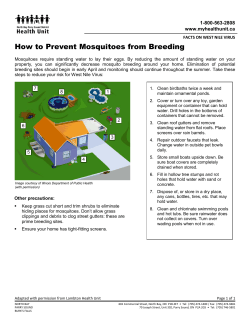
Anim_Quant_Gen_Geno 2015 CONCEPT NOTE - (BecA
TRAINING COURSE CONCEPT NOTE Title ANIMAL QUANTITIVE GENETICS AND GENOMICS Background Projected increases in animal protein demand and consumption are likely to maintain livestock’s position as one of the fastest growing sub‐sectors in agriculture for the foreseeable future, particularly in low‐income and emerging economies. Genetics and genomics provide one of the greatest opportunities to sustainably improve livestock productivity in these economies, in addition to maintaining genetic diversity. The design and application of effective breeding programmes are underpinned by understanding of sound genetic principles. Recent advances in molecular biology, implies that genetic progress can be speeded by means of genomic selection. However, the application of successful breeding programmes continues to be only a dream in Africa due to lacked of required capacity and design. Moreover, the use of genomics in identifying genes associated with production and survival in the harsh climatic conditions of Africa has not received adequate attention. A number of NARS in Africa region continue to use animal methodologies which are outdated. In addition, most of them lack access to the some of the required software for analyzing animal breeding data. This training course seeks to address the skills gap in methodologies in animal quantitative genetics and genomics to increase the capacity of African scientists and institutions to conduct research in animal genetics using methods which are based on recent advances, access to necessary software and ability to design breeding programmes for livestock improvement in Africa. The main target group is researchers at NARS in Africa who are actively engaged in Animal breeding and genomics research, and who need the skills to address technology gaps in their own research programs. Objective(s) To give Animal breeding researchers from Africa the working knowledge of methods in animal quantitative genetics and genomics that can be applied to address technology gaps in their own breeding research programmes, and that can be disseminated to other researchers at their home institutes. Scope of the training workshop Expected outputs and outcomes Selected applicants will attend an intensive 5‐day training course consisting of lectures and hands on practical training in population genetics, mixed linear models, variance component estimation, genome organization, genetic markers, GWAS and genomic selection among others topics. Participants will also be taught practical programming skills and the use of several animal breeding software. Outputs At least 20 animal breeding researchers from NARS in the Africa equipped with 1 practical knowledge of methods and software in animal quantitative genetics and genomics. Outcomes Strengthened practical skills in methods for animal quantitative genetics, genomics and use of animal breeding tools for application to breeding research in NARS in the ECA region. Training Approach Who can apply / selection criteria The workshop will comprise a series of lectures, extensive hands‐on practical, group discussions and experience sharing by participants. Pre‐ and post‐ workshop evaluations will be conducted by both participants and trainers. The BecA‐ILRI Hub is seeking applicants who require basics skills in quantitative genetics and genomics to support their research. The training is targeting early career researchers, based on evidence of productive scholarship and research, relevance of the workshop to applicant’s current research, and visible engagement in agricultural research within a national research institute or university. Additionally, applicants must meet the following criteria: Nationals of any Africa country are eligible but priority will be given to nationals of BecA countries (Burundi, Cameroon, Central Africa Republic, Congo Brazzaville, Democratic Republic of the Congo, Equatorial Guinea, Eritrea, Ethiopia, Gabon, Kenya, Madagascar, Rwanda, São Tomé and Príncipe, Somalia, South Sudan, Sudan, Tanzania, Uganda). Strong affiliation with a national agricultural research program or institution or university in any of the above countries. Currently engaged in animal breeding/genetics research. Holders of BSc, MSc or PhD in Animal breeding and genetics or a related subject. Good working knowledge of written and spoken English. Basic knowledge of computer‐based applications relevant to this course. Endorsement by applicant’s home institution through Letter of nomination/recommendation from head of department or institution head. Women candidates are particularly encouraged to apply. Key Dates Sponsorship Partners Call release date: 27th April 2015 Closing date for applications: midnight 10th May 2015 (Nairobi time) Successful applicants will be notified by: 13th May 2015. Workshop Dates: 1st – 5th June, 2015 There are several funded places for this workshop, on a highly competitive basis. Applicants who can fund their participation will have added advantage. The approximate cost of the course is US$. 1800, excluding flights and accommodation. The training workshop is sponsored by; The Australia Government Department for Foreign Affairs and Trade (DFAT) through a partnership between Australia's Commonwealth Scientific and Industrial Research Organization (CSIRO) and the BecA‐ILRI Hub; 2 The Bill & Melinda Gates Foundation; The Swedish Ministry for Foreign Affairs through the Swedish International Development Cooperation Agency; The Syngenta Foundation for Sustainable Agriculture; Training Venue The Biosciences eastern and central Africa (BecA) Hub at ILRI, Nairobi, is a Centre for excellence in modern plant, animal and microbial biology in Africa. BecA is an initiative developed within the framework of the New Partnership for Africa’s Development (NEPAD)/ African Union African Biosciences initiative. It consists of the Hub, based on the ILRI campus in Nairobi, Kenya, and a network of regional nodes and other affiliated laboratories and organizations throughout the region. The BecA‐ILRI Hub facilities are world class, including a range of molecular, plant transformation and genomics laboratories, and other research platforms. The Hub hosts and conducts research in crop, microbe and livestock areas where new developments in science offer promise to address previously intractable problems constraining Africa’s development. Capacity building is a major goal of all activities. The scope covers agriculture and food security and their intersections with human health and nutrition, and the sustainable use of Africa’s natural resources. Further information is available at http://hub.africabiosciences.org. For any inquiries about this course please contact either Raphael Mrode (r.mrode@cgiar.org) or Wellington Ekaya (w.ekaya@cgiar.org) 3
© Copyright 2025













